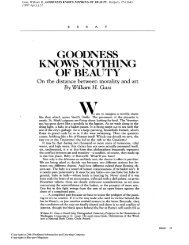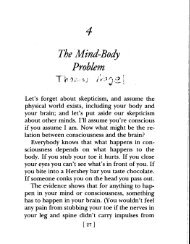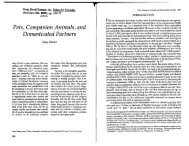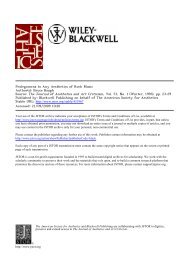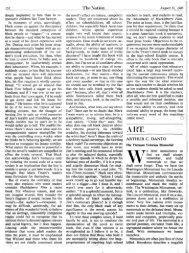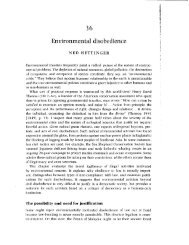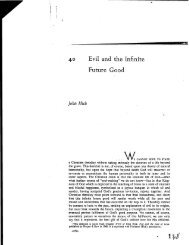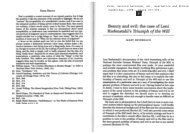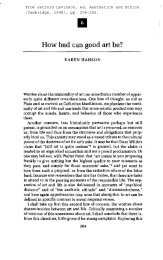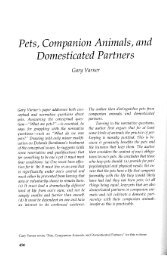Carl Cohen's 'Kind' Arguments For Animal Rights and Against ...
Carl Cohen's 'Kind' Arguments For Animal Rights and Against ...
Carl Cohen's 'Kind' Arguments For Animal Rights and Against ...
You also want an ePaper? Increase the reach of your titles
YUMPU automatically turns print PDFs into web optimized ePapers that Google loves.
52 Nathan Nobis8. Partners in ‘Kind’Cohen’s ‘getting-rights-by-association-in-a-kind’ strategy is not unique. As mentionedabove, Scruton seems to invoke it. Michael Allen Fox suggested it: he claimed that that“human beings have basic moral rights because they are beings of the requisite kind,that is, autonomous beings, persons, or moral agents.” In response to the objectionthat some humans aren’t autonomous moral agents, he claimed that “membership inour own species ought to count for something” [21]. But explaining how humanbiology might, in itself, ‘count’ for being of the kind ‘moral agent’ is obviously difficult.And it’s not clear why our memberships in the kinds ‘sentient-being’ or ‘subject-of-alife’aren’t more obviously rights-relevant anyway. Fox agrees; he later rejected hisoriginal position against animals calling it arrogant, complacent <strong>and</strong> arbitrary.David Schmidtz suggests that a speciesist could respond to objections from ‘marginal’cases in this way:Of course, some chimpanzees lack the characteristic features in virtue of whichchimpanzees comm<strong>and</strong> respect as a species, just as some humans lack thecharacteristic features in virtue of which humans comm<strong>and</strong> respect as aspecies. It is equally obvious that some chimpanzees have cognitive capacities(for example) that are superior to the cognitive capacities of some humans.But whether every human being is superior to every chimpanzee is beside thepoint. The point is that we can, we do, <strong>and</strong> we should make decisions on thebasis of our recognition that mice, chimpanzees, <strong>and</strong> humans are relevantlydifferent types. We can have it both ways after all [22].While mice, chimpanzees, <strong>and</strong> humans are of different types, they are also of somesame types since they share many properties. The problem for this speciesist would bespecifying, in a plausible <strong>and</strong> defensible manner, why being of the type ‘biologicallyhuman’ is, in itself, a morally relevant type. It appears not to be, since human biologyseems neither necessary nor sufficient for having rights: friendly space aliens couldhave rights <strong>and</strong> dead, human cells in a Petri dish do not. This speciesist would alsoneed to explain why a psychological type such as sentience or being-the-subject-of-alifeis not relevant (or is not as relevant). She cannot have it both ways: either she hasa theory of rights that appeals to plausible, psychological types as the basis for rights(which overlap between species), or she appeals to types that are not in themselvesmorally relevant, like DNA possession.Leslie Pickering Francis <strong>and</strong> Richard Norman might provide some help: they suggestthat “what are important are the relations in which human beings st<strong>and</strong> to one another”[23]. They base these relations on shared biological properties, but no reason isgiven why shared psychological properties are not the basis of an equally, or at leastvery, important relation. Finally, Robert Wennberg suggests that, “a fundamental differencein kind [between humans <strong>and</strong> animals] can be found in the religious capacitypossessed by humans” [24]. True, some humans have these capacities, but not all.And if ‘marginal’ humans’ rights depends on these capacities, any attempts to securethem by a relation are probably subject to Cohen-esque objections all over again.So, Cohen is not alone in his kind arguments, but other philosophers’ attempts areas unsuccessful as his are. ‘Kind’ strategies are often suggested, but never carefullydeveloped or defended.© Society for Applied Philosophy, 2004



